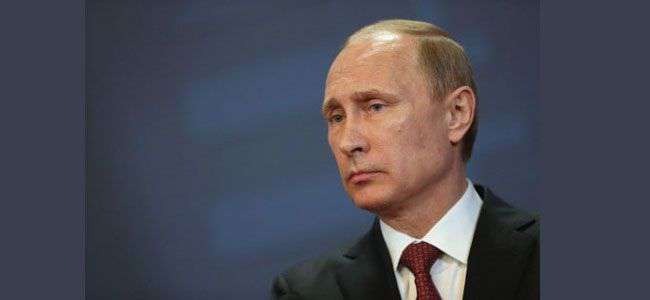The West should expect rising tension with Russia as President Vladimir Putin took the stage on a square outside the Kremlin to claim victory in Sunday’s national election.
At an open-air concert celebrating the fourth anniversary of his annexation of Crimea, the re-elected President, who got the election show he wanted, thanked the crowd for their support in the “very difficult circumstances” of recent years and then led a chant: “Russia! Russia! Russia!”
In the weeks leading up to re-election to six more years in power, the President hardly campaigned and offered few concrete plans for major domestic reforms.
He, however, awed Russians with displays of fantastic new weaponry while state-controlled television reported about the threats allegedly posed by the US and its allies.
The unified storyline: Russia is under attack, and it needs a strong leader to survive.
“This is a consolidated response to the pressure that is currently exerted on Russia,” the co-chair of Putin’s electoral headquarters, Yelena Shmelyova, said.
“There is a view that this unfairness is growing even stronger. This is our common response to it,” Shmelyova said.
As Putin assembles his next government in the coming months, he needs to manage the competing interests of a ruling elite angling for influence in a post-Putin era that will someday arrive.
As infighting over the country’s domestic course continues at the top, Putin will have an interest in intensifying the conflict with the West, The Washington Post quoted analysts as saying.
“This destruction of the systems of governance leads to adventurism abroad,” said Gleb Pavlovsky, a former Kremlin adviser turned prominent Putin critic. “That’s why this activity abroad will only intensify.”
Pavlovsky said British Prime Minister Theresa May delivered Putin a “pre-election present” by accusing Russia of the attack on former spy Sergei Skripal and mustering an assertive response.
The British response angered Russians and motivated some voters who may have otherwise stayed home, he said.
“I believe any sensible person understands that it’s craziness, idiocy and nonsense to think that anyone in Russia would allow themselves to do something like this on the eve of the presidential elections and the soccer World Cup,” Putin said about the Skripal case. “It’s simply unfathomable.”
Russia is also threatening escalation in Syria, where its fight in support of President Bashar al-Assad is raising the risk of a military collision with the U.S.
Last week, the head of Russia’s General Staff, General Valery Gerasimov, accused Washington of planning a cruise missile strike on Damascus. Offering no evidence, he pledged that Moscow would retaliate against “the missiles and launchers used”.
“The strategy of coercion by unpredictability and the resolve to be unhinged will continue for a while,” said Vladimir Frolov, an independent foreign policy analyst in Moscow. “But the problem for Putin is that he has a plan to escalate, but not one to de-escalate.”
Six years ago, Putin stepped up his anti-American rhetoric and continued street demonstrations against him. US officials, thinking it a campaign ploy, expected him to dial back the heat once he was safely in office – but that never happened. And it’s unlikely to happen now.
Escalation abroad helps Putin consolidate power at home. As a power struggle within the ruling elite over his succession looms, he may need it, the daily said.
With his win of another six-year term on Sunday, the road is clear on paper for the 65-year-old President to rule until 2024 – something that would give him close to a quarter-century in power.
According to analysts, they would not be surprised to see him try to extend his rule beyond that, perhaps by taking a lesson from Chinese President Xi Jinping and eliminating term limits or taking on some kind of extra-political office that would turn him into a national leader akin to Iran’s supreme leader Ayatollah Khomeini.
“Someone who rules for so long will be tempted to perhaps continue this existence,” said Andrei Kolesnikov, the lead domestic policy specialist at the Carnegie Moscow Centre think tank. “For a person who annexed part of another country, there are practically no limits.”
How Putin manages succession will be seen in May when the leader puts his next government together. Keeping Prime Minister Dmitry Medvedev in his current post will be a sign that Putin wants to minimise the speculation about his successor.
Reinserting the comparatively liberal former Finance Minister Alexei Kudrin into the government would be a setback for the hard-line military and intelligence wing in the Kremlin and a sign that the President may carry out some economic reforms.
Despite the uncertainty in the Kremlin, the pro-democracy opposition to Putin looks more disorganised than it has been in years.
The most striking symbol of the Russian President’s staying power was not his inevitable electoral victory but a debate streamed on YouTube between two leading faces of the opposition — anti-corruption activist Alexei Navalny and former liberal television host Ksenia Sobchak.
In a live broadcast viewed by more than 100,000 people, Navalny lit into Sobchak for running at all. Her decision to do so simply added a patina of legitimacy to Putin’s “false and fake” election, he said. The government allowed Sobchak to run and gave her television airtime, while Navalny was barred from the ballot and kept off the TV.
Sobchak’s future is another wild card. As the daughter of Putin’s onetime mentor, the late St. Petersburg Mayor Anatoly Sobchak, she is in the unique position of having a personal relationship with the President even though she criticises him publicly.
She has announced plans to form a new political party – something that could further sideline Navalny, who is the Russian opposition leader with the most nationwide support and wants to tear down the Putin system.








